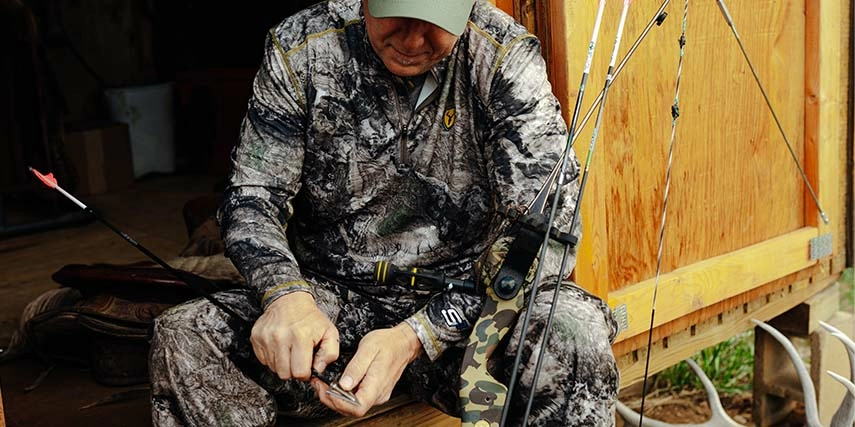After successfully harvesting a bull elk while hunting with a good friend, T.V. host, and bowhunting pro Fred Eichler says he received a reality check on what could have been.
While still on an adrenaline high after harvesting an elk with a bow, Eichler and his friend packed his elk out when a wild grouse flew up to a nearby tree. Eichler immediately thought, “I’m going to shoot that grouse.” After grabbing his bow and getting in position to make a shot at the perched bird, Eichler began to draw his bow, only to have the string break into pieces.
“If I had taken one more practice shot, it would have broken while drawing on the elk,” explained Eichler. After the close encounter with his bowstring, Eichler says he is overly cautious about checking all his gear before hunting.
Whether traveling across the country as much as Eichler or simply being a weekend hunter that travels only a short distance, having a hunt cut short or ruined due to equipment failure is devastating. Especially when it could have been preventable with a short equipment checklist and a little practice beforehand.
Equipment Checklist
Whether hunting near his home in Aguilar, Colorado, or traveling across the United States and other countries, Eichler says he has a mental checklist that he conducts before every hunt.
“Before leaving on a hunt, I check my bow for all the weak spots.” He explained that he closely inspects the bow’s limbs, the rest, strings, cables, and much more. Eichler says whether it is his compound or recurve, there is always something to check before hunting in the field. He jokingly states there are only three or four screws to check on a recurve, depending on which bow you shoot. As for a compound bow, Eichler says it requires a much more detailed inspection. “The last I checked, I think there were thirty-four set screws, which are many pieces that can work loose or fall out when traveling or during a hunt.”

After ensuring everything is in good working condition and ready to use without any failures, Eichler is ready to hunt. To further be prepared, he says it is a great idea to have a backup bow that is also in good working condition and is a bow that the hunter is familiar with from previous practice. Unfortunately, equipment such as a bow can get banged around or damaged while on an airplane or in a vehicle when traveling a farther distance. When you are many miles away from home, the last thing you want to happen is to end a hunt because you don’t have anything to hunt with. Traveling with a backup prepares you for the hunt when accidents happen. Plus, it gives you an excuse to buy another bow!
As another form of proper preparation before hunting, Eichler explained that checking arrows, nocks, and broadheads is crucial in preventing mishaps. “Checking things such as nocks can be crucial. I have seen nocks blow up in mid-flight because they were cracked or damaged.” Inspecting arrows for damage, nocks, vanes, or fletching, and even broadheads can ensure everything works. More importantly, it is safe and can prevent injury to yourself or a mishap on the animal you are hunting.
Proper Practice To Prevent Failure In The Field
When arriving at the area, you plan to hunt, after a long journey, or before hunting when at home, shooting your bow is critical in preventing mishaps in the field. “After arriving on a hunt, even if it is dark and I have to use headlights on my vehicle, I always shoot my bow a few times to ensure everything is in working order,” says Eichler.
Eichler shares that shooting after arriving on a trip is crucial, yet even throughout the hunting season, it is still essential to shoot your equipment periodically to ensure everything is working. “After a day of walking through the mountains elk hunting, or even when up and down a treestand while whitetail hunting, your bow is subject to many beatings and banging around that could cause damage.” The constant checks will help keep you from missing an animal or, in the worst-case scenario, injuring an animal because of improper working equipment.



